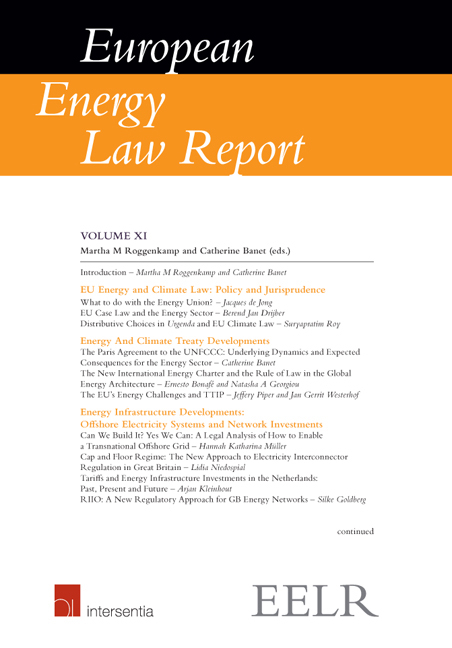Book contents
- Frontmatter
- Editorial
- Contents
- List of Abbreviations
- List of Contributors
- Introduction
- Part I EU Energy and Climate Law: Policy and Jurisprudence
- Part II Energy and Climate Treaty Developments
- Part III Energy Infrastructure Developments: Offshore Electricity Systems and Network Investments
- Part IV Heat Supply Legislation in the Eu
- Part V Security of Energy Supply and Safety
Introduction
Published online by Cambridge University Press: 29 September 2018
- Frontmatter
- Editorial
- Contents
- List of Abbreviations
- List of Contributors
- Introduction
- Part I EU Energy and Climate Law: Policy and Jurisprudence
- Part II Energy and Climate Treaty Developments
- Part III Energy Infrastructure Developments: Offshore Electricity Systems and Network Investments
- Part IV Heat Supply Legislation in the Eu
- Part V Security of Energy Supply and Safety
Summary
The European Energy Law Report XI presents an overview of the most important developments in the field of international, European Union (EU) and national energy law and climate change law discussed at the 27th European Energy Law Seminar, which was held on 25 and 26 January 2016 in The Hague in the Netherlands. The book is divided into five Parts and each Part covers a different development in the energy and climate sector. The order and content of these sections is not necessarily the same as the papers presented at the seminar.
EU ENERGY AND CLIMATE LAW: POLICY AND JURISPRUDENCE
The first Part of the book discusses some important developments in the process of creating a sustainable internal energy market. It starts with an assessment of the concept to create an EU Energy Union and some of the legislative proposals which will influence the structure of the EU energy market. The subsequent chapters present relevant case law, starting with an overview of some EU case law applying to the energy sector and thereafter providing an in-depth assessment of the Urgenda case, which may prove to have a broader impact than just in the Netherlands.
The establishment of the EU Energy Union is discussed in Chapter I by Jacques de Jong. He puts the establishment of an EU Energy Union in the broader context of the process of the European energy market integration starting with the establishment of the European Coal and Steel Treaty and the Euratom Treaty in the 1950s. The author sees the EU Energy Union as the logical continuation of this process and as an essential momentum in the European integration process. Despite this positive assessment of the rationale behind the Energy Union strategy, the author notes the risks of introducing even more ‘Europe’ into the current political environment. Following the famous theme of the 1960s movie ‘the good, the bad and the ugly’ the author thus analyzes the concept and impact of the European Energy Union.
Berend Jan Drijber presents in Chapter II an overview of recent EU case law applying to the energy sector. The impact of the proposed Energy Union is currently still limited as legal measures are in the process of being drafted or adopted.
- Type
- Chapter
- Information
- European Energy Law Report XI , pp. 1 - 8Publisher: IntersentiaPrint publication year: 2017

